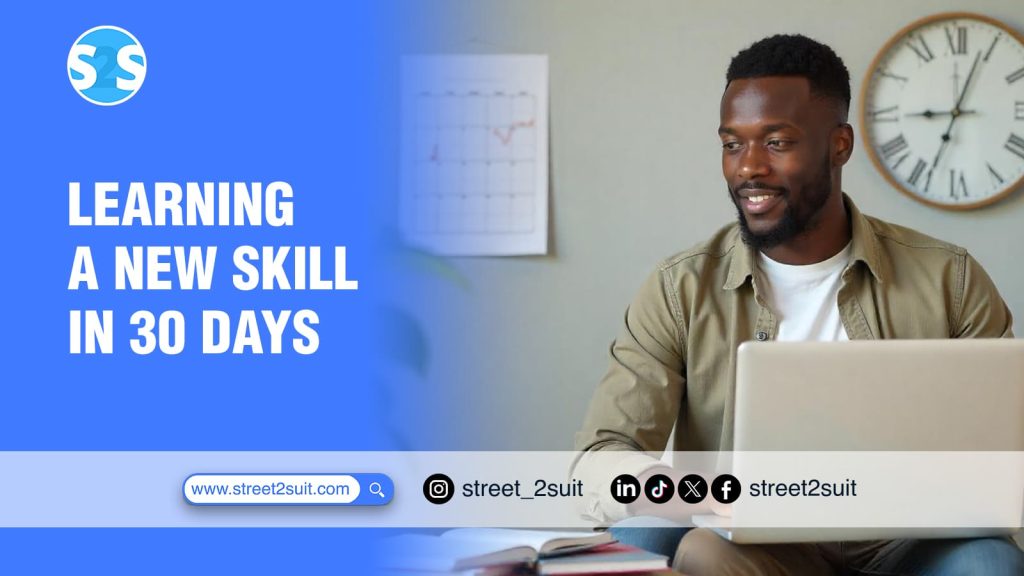Learning and mastering a skill can be tedious. You can get tired and bored along the way.
News flash: it won’t get easier, but there’s a way. If only you can be focused and determined to learn a skill, it would help you in the long run.
In a world of fast-paced growth and limited time, the idea of short-term skill acquisition is more relevant than ever. Many organisations now require employees to be highly skilled, especially in corporate spaces. An added skill is a plus compared to a candidate with little or no additional skills.
The internet has been very kind, you can literally learn anything, absolutely anything, both through paid and free courses. All that is required of you is your dedication and complete commitment.
In this article, we’ll be breaking down seven key strategies on how to learn and master a skill in 30 days.
1. CHOOSE A SKILL AND STICK WITH IT
One of the reasons we don’t complete learning a skill is because we juggle several courses together. Multitasking is great, but our brains need focus. Sticking with one skill will reduce divided attention and make it easier to grasp what you’re learning.
There are several skills you can start with. It’s always advisable to start with one that piques your interest. The first step is to start with one— not two, not three. Stick with one.
2. SET REALISTIC AND MEASURABLE GOALS
After choosing a skill to learn in 30 days, the next step is to set realistic goals. Break down what you want to achieve. Yes, you’ll gain a skill eventually, but writing down your goals will help you stay efficient during the 30 days. On days when you need motivation, you’ll be reminded of the reason you started.
When setting these goals, it’s advisable to set SMART goals. They must be Specific, Measurable, Achievable, Relevant, and Time-bound. For example, if you want to learn a digital skill like data analysis, write down the basics you want to have achieved by day 30. It could be learning and mastering Microsoft Excel. Setting goals keeps you focused and gives a sense of progress.
3. DESIGN A DAILY STRUCTURE
To learn a skill in 30 days, it’s important to have a daily structure. This is everything you’ll do daily to achieve the goal you’ve set. For example, when learning Microsoft Excel, you could allocate a specific time slot each day (e.g., 30 minutes before breakfast). Stick with that time to build consistency.
Consistency beats intensity, even 20 focused minutes a day adds up. Using checklists, planners, or habit-tracking tools will help you stay efficient and effective.
4. USE FOCUSED, HIGH-QUALITY RESOURCES
There are millions of resources out there, but using quality materials is key. You could make a list of the resources you plan to use such as books, tutorials, courses. Before choosing, do your research. A lot of top-rated professionals post the courses and books they’ve taken on LinkedIn, especially in the certificates section.
Yes, they might want to promote their materials, but be careful not to be carried away. It’s always good to ask, do thorough research, then start with what you’ve gathered. Sometimes, you might make mistakes and pick irrelevant materials but don’t be discouraged. Keep moving until you achieve your challenge.
Avoid resource overload. Stick to 1–2 platforms to stay focused.
5. EMBRACE THE LEARNING CURVE
Some days, you won’t want to do anything. It might feel like you’re showing up but seeing little or no results. The truth is, learning and mastering a skill takes time and the only way to speed it up is to be consistent.
Do it anyway. Make up your mind that there will be challenges and embrace them. It’s a curve, not a straight line. Celebrate your small wins. Document your process. You could keep a journal or notebook to detail what you’ve learned each day. Improvement is incremental.
6. LIMIT DISTRACTIONS AND BUILD FOCUS
Distractions will come. You can’t avoid them, but what you do when they come will determine your success.
It’s much easier to scroll on social media than read a productive book. It’s easier to gist with friends than lock in on a course. The difference is your priority. Identify your distractions and avoid them like a plague.
If it means using your laptop instead of your phone, do it. If you need to go to a quiet place, go. The goal is to complete and learn a skill in 30 days and that will only happen if you stay disciplined. Set up a space and environment that supports learning.
7. REFLECT, ADJUST, AND STAY COMMITTED
As you wrap up each week, take time to reflect and adjust. Go over what you did right and what needs improvement. Check what’s working and what’s not.
Adjust to the process, and try to complete the learning. There’s a light at the end of the tunnel.
The aim is to finish the 30-day challenge. Don’t abandon it midway. Motivate yourself daily by reminding yourself of why you started and the goals you set.
CONCLUSION
Learning a new skill in 30 days is absolutely possible with the right mindset, discipline, and structure. It may not always be easy, but staying consistent, focused, and intentional can lead to real growth and transformation.
Whether it’s for personal development or career advancement, dedicating time to learn something valuable can open new doors. Choose a skill, set clear goals, stick to your routine, and avoid distractions.
Most importantly, don’t give up halfway. Progress may be slow at first, but with daily effort, you’ll be amazed at how far you can go in just one month.
You don’t need a lifetime to learn something new. With focus, intentionality and commitment, you can master a new skill in just 30 days. And who knows? It might be the start of a life-changing journey.
Receive the latest job and career updates in your inbox, every week!




